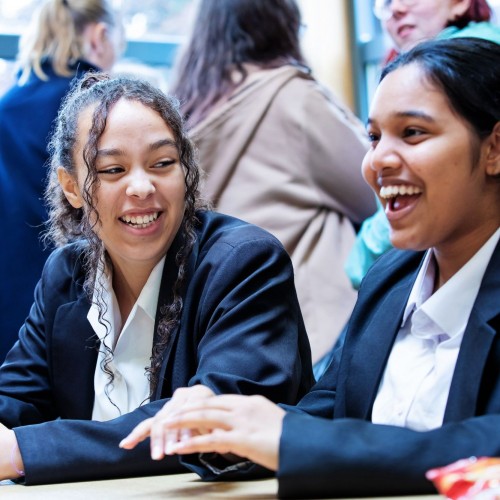Science
We are very aware of the importance of science, perhaps more so now than ever before. We passionately believe that science is more than a body of knowledge to be imparted to our students. It is not static and is also a way of thinking. It is this scientific method that we encourage our students in all years to develop.
Through practical experiments, the Science Faculty’s first priority is to ensure that all our students receive dynamic, engaging lessons. We recognise that the key to success lies in unlocking the potential of the individual student and are guided by asking “How can we better support our students to achieve their very best?”
The Science Faculty comprises a highly motivated team of teachers who teach within their degree specialism, and our amazing technical staff who work together to provide enriched and memorable learning experiences for our students. By combining highly supportive leadership with a risk-taking approach to the design of innovative student-centred learning, we are working towards our vision of progressive science teaching.
The Science Faculty curriculum vision builds upon that of our whole school:
• To inspire our students with the awe and wonder inherent within our subject
• To develop practical science skills and questioning minds
• To develop scientific literacy and numeracy, and focus upon the development of its rich history
• To contextualise the relevance of topics to international, national and local events and labour markets.
Our aim in science in Years 7 and 8 is to develop a deeper understanding of the subject disciplines of biology, chemistry and physics. Pupils should begin to see the connections between these subject areas and become aware of some of the big ideas underpinning scientific knowledge and understanding. These big ideas include: particles, cells, forces, energy and evolution and are all covered in Year 7. These ideas are referred back to in Year 8 as students begin to develop a deeper understanding of the structure and function of living organisms, fundamental life processes, chemical reactions, earth processes and cycles, the Periodic Table, the effects of unbalanced forces and energy transfers.
Students are encouraged to relate scientific explanations to phenomena in the world around them and start to use modelling and abstract ideas to develop and evaluate explanations. Throughout Years 7 and 8 pupils should develop their use of scientific vocabulary, including the use of scientific nomenclature and units and mathematical representations. We recognise that science is a knowledge based subject the best way to prepare students for future study – and the doors that these qualifications will open – and to prepare students to the technological advances of society in later life, is a firm foundation of scientific knowledge and understanding. Key Stage 3 science is where this foundation is built.
Please note: Science is a practical subject and so we work on rotations to minimise clashes of equipment. Your son or daughter may do these modules in a different order.
Students study Combined Science at GCSE or can chose to study Triple Science as one of their options. Students learn the essential knowledge of Biology, Chemistry and Physics to help them understand the material world, which is so vital to the world’s future prosperity.
Biology – the life processes of plants and animals, how these organisms interact and have evolved over time,
Chemistry – the structure of atoms, how this links to their properties and reactions,
Physics – the fundamental concepts of energy and force to explain how objects interact and do what they do.
Students also develop methods of scientific enquiry including experimentally by completing practical work with a number of core practicals. The topics studied are shown below in an example of the order of study. For Combined Science the example shows two parallel paths taught by two teachers who will share the teaching of one of the subjects. For Triple Science, students have one teacher for each separate subject with additional material which provides a deeper and broader understanding. This is beneficial at A Level but not essential. Both courses have six exams at the end, two per subject that are slightly longer for Triple Science.
GCSE Combined Science
GCSE Biology
GCSE Chemistry
GCSE Physics
Please note: Science is a practical subject and so we work on rotations to minimise clashes of equipment. Your son or daughter may do these modules in a different order.
A Level Sciences take the knowledge and skills developed at GCSE and deepen and widen the focus to support the future study of sciences at degree level. Science subjects are an excellent study for opening doors for future careers and the relevance of science knowledge and understanding has never been so clear.
All science studies focus on the key knowledge of their subjects, but also include modern developments ins their studies. Examples of this would be epigenetics (Biology), fuel cells (Chemistry) and quantum phenomena (Physics). This way, students are engaged and inspired and many go on to choose a career in these areas.
We offer Biology, Chemistry and Physics at A Level. We have a strong focus on the development of practical skills and on developing opportunities for our students to learn outside the classroom. Our Year 12 physics students benefit from a trip to the CERN laboratories in February half term of each year.
A Level Biology
A Level Chemistry
A Level Physics
We offer additional after school support classes to Years 9-13 on Tuesdays and Wednesdays.











